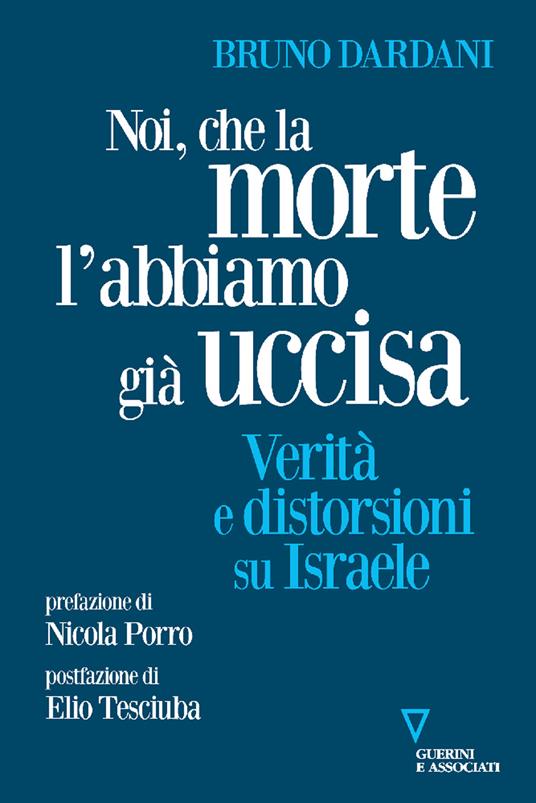BOOKS – Israel: truths and distortions, the testimony of Dardani
 In the afterword of the book, Elio Tesciuba notes: “Israel is a land that changes you; it makes you face your beliefs and prejudices.” Then adds: “It’s a country that invites us to think, to call everything into question and to search for the truth beneath the surface.” A search that for journalist Bruno Dardani, who has worked for the newspaper Sole 24 Ore as a special correspondent for more than 20 years all over the world, including in the Middle East, has reached its final destination in the book Noi, che la morte l’abbiamo già uccisa. Verità e distorsioni su Israele (Us, who have already killed death. Truths and distortions on Israel) recently published by Guerini e Associati.
In the afterword of the book, Elio Tesciuba notes: “Israel is a land that changes you; it makes you face your beliefs and prejudices.” Then adds: “It’s a country that invites us to think, to call everything into question and to search for the truth beneath the surface.” A search that for journalist Bruno Dardani, who has worked for the newspaper Sole 24 Ore as a special correspondent for more than 20 years all over the world, including in the Middle East, has reached its final destination in the book Noi, che la morte l’abbiamo già uccisa. Verità e distorsioni su Israele (Us, who have already killed death. Truths and distortions on Israel) recently published by Guerini e Associati.
The title is the same as that of the fourth chapter of the book, one of the most intense, which tells of an encounter that happened in Eilat over thirty years ago. It’s the New Year’s Eve dinner of the year 1993, an ordinary dinner really, until a group of 80-year-olds invites the author and his wife to join them. Between plates of hummus and tahina, fresh vegetables and falafel, the elderly diners start talking about their plans for the future, rather than regrets of the past and the complaints about what has been and will never be again. Some are planning to take their grandchildren to India, some to accompany their family to Canada to see bears cub been born. The uninterrupted flow of ideas strikes a chord with the couple. “We’ve already killed death,” asserts a man named Sam, a Holocaust survivor, showing the tattoo the Nazis gave him.
Dardani’s book is a precious contribution that allows us to understand all the little parts that make up Israel’s soul, both before and after October 7. From Jerusalem to the Negev, from the ancient Masada that “shall never fall again” to the peculiarity of the word shalom, which is so much more than just a greeting.
Dardani also recounts his visit to Gaza in the 1990s. “In the dusty streets, Palestinian police patrols rage against helpless kids, apparently without any motive – just to prove and reiterate the power of their uniforms and batons, which are used without restriction. And Hamas is not in power yet”, he writes. “The questions from my improvised driver move from football to the West. There’s no resentment in his words, only the hope to find a way out, in a world not so full of hate.” A hope that is always present, and that is especially present in a book that stands out for its originality, amongst all those published that talk about the events of October 7.
“Today, everyone is talking about Israel’s stubborn isolation from the international community. Everyone is talking about an excessive reaction, about the resurfacing of the old habit of Israel’s population to isolate itself in an attempt to hide its faults behind a voluntary marginalization.” These are the words of the journalist Nicola Porro in the foreword of the book. “This book is meant to destroy that Pandora’s box full of preconceptions and prejudice.”
Translated by Rebecca Luna Escobar and revised by Francesco Gambino, students at the
Advanced School for Interpreters and Translators of the University of Trieste, trainees in the newsroom of the Union of the Italian Jewish Communities — Pagine Ebraiche.
